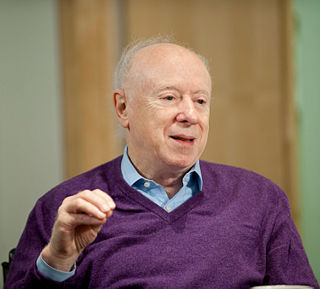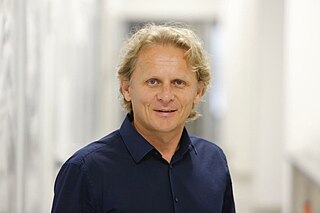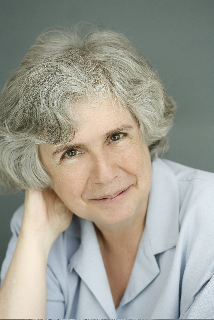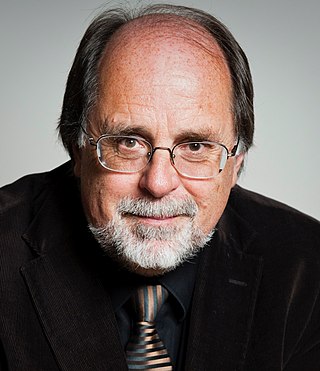Related Research Articles

The Rockefeller University is a private biomedical research and graduate-only university in New York City, New York. It focuses primarily on the biological and medical sciences and provides doctoral and postdoctoral education. It is classified among "R2: Doctoral Universities – High research activity." Rockefeller is the oldest biomedical research institute in the United States.

Joseph Leonard Goldstein ForMemRS is an American biochemist. He received the Nobel Prize in Physiology or Medicine in 1985, along with fellow University of Texas Southwestern researcher, Michael Brown, for their studies regarding cholesterol. They discovered that human cells have low-density lipoprotein (LDL) receptors that remove cholesterol from the blood and that when LDL receptors are not present in sufficient numbers, individuals develop hypercholesterolemia and become at risk for cholesterol related diseases, notably coronary heart disease. Their studies led to the development of statin drugs.

Bruce Michael Alberts is an American biochemist and the Chancellor’s Leadership Chair in Biochemistry and Biophysics for Science and Education, Emeritus at the University of California, San Francisco. He has done important work studying the protein complexes which enable chromosome replication when living cells divide. He is known as an original author of the "canonical, influential, and best-selling scientific textbook" Molecular Biology of the Cell, and as Editor-in-Chief of Science magazine.

Ahmad-Reza Dehpour is an Iranian pharmacologist and biomedical scientist, among the top 1% in the world, and the world's highly cited researchers announced by Thomson Reuters ISI. He is currently a distinguished professor of pharmacology at the School of Medicine, Tehran University of Medical Sciences (TUMS). He is also the director of the Experimental Medicine Research Center and the director of drug discovery and evaluation committee in the National Institute for Medical Research Development.

Mildred Cohn was an American biochemist who furthered understanding of biochemical processes through her study of chemical reactions within animal cells. She was a pioneer in the use of nuclear magnetic resonance for studying enzyme reactions, particularly reactions of adenosine triphosphate (ATP).

John Kuriyan is the Dean of Basic Sciences and a Professor of Biochemistry at Vanderbilt University School of Medicine. He was formerly the Chancellor's Professor at the University of California, Berkeley in the departments of Molecular and Cell Biology (MCB) and Chemistry, a Faculty Scientist in Berkeley Lab's Physical Biosciences Division, and a Howard Hughes Medical Institute investigator. He is a member of the National Academy of Sciences and he has also been on the Life Sciences jury for the Infosys Prize in 2009, 2019 and 2020.

Jeremy Mark Berg was founding director of the University of Pittsburgh Institute for Personalized Medicine. He holds positions as Associate Senior Vice Chancellor for Science Strategy and Planning and Professor of Computational and Systems Biology at the University of Pittsburgh. From 2016 - 2019, Berg was editor in chief of the Science journals.

The American Society for Biochemistry and Molecular Biology (ASBMB) is a learned society that was founded on December 26, 1906, at a meeting organized by John Jacob Abel. The roots of the society were in the American Physiological Society, which had been formed some 20 years earlier. ASBMB is the US member of the International Union of Biochemistry and Molecular Biology.

Jack William Szostak is a Canadian American biologist of Polish British descent, Nobel Prize laureate, university professor at the University of Chicago, former Professor of Genetics at Harvard Medical School, and Alexander Rich Distinguished Investigator at Massachusetts General Hospital, Boston. Szostak has made significant contributions to the field of genetics. His achievement helped scientists to map the location of genes in mammals and to develop techniques for manipulating genes. His research findings in this area are also instrumental to the Human Genome Project. He was awarded the 2009 Nobel Prize for Physiology or Medicine, along with Elizabeth Blackburn and Carol W. Greider, for the discovery of how chromosomes are protected by telomeres.
Franz-Ulrich Hartl is a German biochemist and Managing Director of the Max Planck Institute of Biochemistry. He is known for his pioneering work in the field of protein-mediated protein folding and is a recipient of the 2011 Lasker Award along with Arthur L. Horwich.
The Dr. Paul Janssen Award for Biomedical Research is given annually by Johnson & Johnson to honor the work of an active scientist in academia, industry or a scientific institute in the field of biomedical research. It was established in 2004 and perpetuates the memory of Paul Janssen, the founder of Janssen Pharmaceutica, a Johnson & Johnson subsidiary.

Ivan Đikić is a Croatian-German molecular biologist who is the Director of the Institute of Biochemistry II at Goethe University Frankfurt.

Lynne Elizabeth Maquat is an American biochemist and molecular biologist whose research focuses on the cellular mechanisms of human disease. She is an elected member of the American Academy of Arts and Sciences, the National Academy of Sciences and the National Academy of Medicine. She currently holds the J. Lowell Orbison Endowed Chair and is a professor of biochemistry and biophysics, pediatrics and of oncology at the University of Rochester Medical Center. Professor Maquat is also Founding Director of the Center for RNA Biology and Founding Chair of Graduate Women in Science at the University of Rochester.

Martha Ludwig was an American macromolecular crystallographer. She was the J. Lawrence Oncley Distinguished University Professor of Biological Chemistry at the University of Michigan.

Susan Gottesman is a microbiologist at the National Cancer Institute (NCI), which is part of the National Institutes of Health. Gottesman has been the editor of the Annual Review of Microbiology since 2008.
Albert Baird Hastings was an American biochemist and physiologist. He spent 28 years as the department chair and Hamilton Kuhn Professor of Biological Chemistry at Harvard University. After retiring from Harvard, Hastings moved to the Scripps Clinic and Research Foundation, where he became the director of the division of biochemistry and helped to establish the institution's emerging program in basic research. In 1966, he became one of the first faculty members at the University of California, San Diego's new medical school. His research focused on the biochemical underpinnings of physiology and included characterizing acid-base homeostasis in blood and pioneering the use of radioactive tracers for studying metabolism. Hastings received a number of honors and awards for his work, including election to the National Academy of Sciences in 1937 and the President's Medal for Merit in 1948 following his wartime service on the Committee for Medical Research. Hastings died of heart failure in 1987 at age 91.

Ari Helenius is a Finnish emeritus professor of biochemistry who is known for his research in virology.
Joan Weliky Conaway is an American biochemist who researches gene transcription. She worked at the Stowers Institute for Medical Research from 2001 to 2021 and currently serves as Vice Provost and Dean for Basic Research at the University of Texas Southwestern Medical Center. She is a member of the National Academy of Sciences and American Academy of Arts and Sciences.
Daniel Robert Kuritzkes is an American physician.
References
- ↑ "Edmond H. Fischer. The Nobel Prize in Physiology or Medicine 1992". The Nobel Foundation.
In collaboration with Bert Vallee, we were able to demonstrate that these enzymes were in reality calcium-containing metalloproteins.
- ↑ "Home". thevalleefoundation.org.